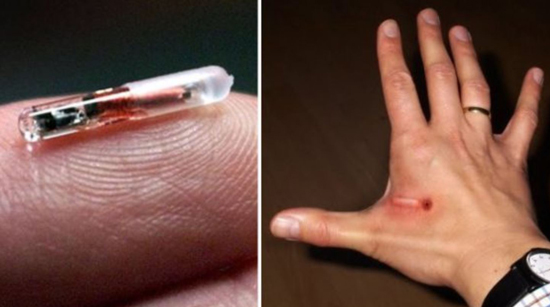Olympic Athletes Could Soon Face Being Microchipped ‘Like Dogs’ To Compete

While some say microchipping humans is the wave of the future, others think it could be the Biblical “mark of the beast”. Regardless, the next group to face the potentiality of being microchipped like dogs are Olympic athletes.
According to WND, the head of an association of Olympic athletes wants to require anyone who participates in the Summer or Winter Games to be implanted with a tracking chip to prevent the use of performance-enhancing drugs. Mike Miller, the CEO of the World Olympians Association, remarked at an anti-doping forum in London that athletes should accept digital implants or be barred from Olympic-level competition, according to The Guardian.
Speaking to anti-doping leaders at a Westminster forum on integrity in sport, Miller said: “In order to stop doping we need to chip our athletes where the latest technology is there.” He continued, saying: “Microchips get over the issue of whether the technology can be manipulated because they [athletes] have no control over the device. The problem with the current anti-doping system is that all it says is that at a precise moment in time there are no banned substances but we need a system which says you are illegal substance-free at all times and if there are changes in markers they will be detected.”
Consumer privacy expert Liz McIntyre, the co-author of Spychips: How Major Corporations and Government Plan to Track Your Every Purchase and Watch Your Every Move, called Miller’s proposal “outrageous” insisting “no human being should ever be forced to accept a tracking implant to fully participate in society”. Miller reiterates that it isn’t about “privacy”, however, and Olympic athletes aren’t exactly regular members of society. “Some people say it’s an invasion of privacy”, Miller said. “Well, sport is a club and people don’t have to join the club if they don’t want to, if they can’t follow the rules.”
Although Miller didn’t specify what kind of microchip technology he was considering, McIntyre pointed out there are RFID chips with sensors that could detect the health status of a host or substances in the blood as would be the intention – to stop drug cheats. “When someone in Miller’s position has the audacity to suggest that RFID dog tracking chips are an acceptable prerequisite for participation in any endeavor, it’s time for action”, McIntyre said.
“Some say we shouldn’t do this to people”, Miller continued. “Well, we’re a nation of dog lovers, we’re prepared to chip our dogs and it doesn’t seem to harm them, so why aren’t we prepared to chip ourselves?”
Perhaps we microchip dogs because we own them, and perhaps we don’t want a microchip because we don’t feel like being owned by whoever demands we have that chip implanted. It’s a difficult concept for the more authoritarian minds in society to grasp, sadly.
In 2017, a company in Wisconsin became the first to microchip the employees.
The idea to microchip athletes will probably not sit well considering the existing ADAMS whereabouts system is already invasive when it comes to an athlete’s privacy. Whereabouts rules dictate that athletes must declare on an online database where they will be every day for a one-hour window between 5 am and 11 pm, so drug testers can turn up without warning. The athlete biological passport system has been the most crucial development in anti-doping in recent years, with blood test results analyzed over a period of time for the effects rather than just the mere presence of drugs.
Nicole Sapstead, the UK Anti-Doping chief executive, was wary a move to microchipping of athletes would represent an egregious invasion of their privacy. “We welcome verified developments in technology which could assist the fight against doping. However, can we ever be sure that this type of thing could never be tampered with or even accurately monitor all substances and methods on the prohibited list? There is a balance to be struck between a right to privacy versus demonstrating that you are clean. We would actively encourage more research in whether there are technologies in development that can assist anti-doping organizations in their endeavors.”
Miller claimed he was not speaking on behalf of the World Olympians Association when he suggested implanting Olympic athletes with microchips. “I’m just throwing the idea out there” he said. “I’m gauging reaction from people but we do need to think of new ways to protect clean sport. I’m no Steve Jobs, but we need to spend the money and use the latest technology.”
yogaesoteric
April 5, 2018
